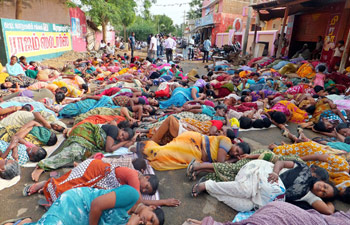 15 July 2013 On the 700th day of their protest against the Kudankulam Nuclear Power Project (KNPP), villagers of Idinthakarai in Tamil Nadu “dropped dead” on the roads in a symbolic gesture, an anti-plant activist said Monday.”
15 July 2013 On the 700th day of their protest against the Kudankulam Nuclear Power Project (KNPP), villagers of Idinthakarai in Tamil Nadu “dropped dead” on the roads in a symbolic gesture, an anti-plant activist said Monday.”
Several villagers who were walking on the roads suddenly fell down ‘dead’. After some time, they got up. A public meeting was also held today (Monday),” S.P. Udayakumar, coordinator of the People’s Movement Against Nuclear Energy (PMANE) told IANS over phone from Idinthakarai.
The ‘drop dead’ gesture was an enactment of the impact the power plant would have on people. The protest was held against the clearance granted by the Atomic Energy Regulatory Board (AERB) to KNPP’s first 1,000 MW unit to start nuclear fission.
On Saturday night, the KNPP’s first reactor attained criticality or began nuclear fission.
The villagers in the vicinity of the KNPP have been protesting against the nuclear power plant for the past 700 days, fearing for their lives in the wake of the nuclear accident in Fukushima, Japan, in 2011, under the PMANE banner.
The Nuclear Power Corporation of India Ltd (NPCIL) is building two reactors of 1,000 MW each. The reactors are supplied by Russia.
Refuting rumours that the protest would take a violent turn, Udayakumar said: “Ours is a peaceful protest. We don’t believe in violence. We will not cooperate. A plant of this nature would need the cooperation of the locals.”
“It is a genuine struggle of the working class. But it is not being recognised. We had knocked several doors — government, experts, courts — but no door was opened to us,” M. Pushparayan, another PMANE leader, told IANS.
Udayakumar questioned the urgency for giving the “first approach to criticality” clearance even before the apex court had the time to go through the reports filed by AERB, Nuclear Power Corporation of India Ltd (NPCIL) and the union ministry of environment and forests.
He said the fight against KNPP would continue — legally, scientifically and politically.
Udayakumar said a case had been filed in the Madras High Court Monday, challenging the AERB’s clearance for the first KNPP unit to go critical.

